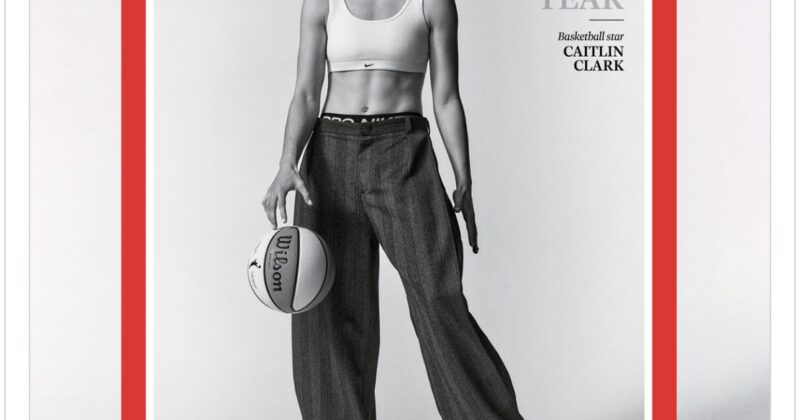Caitlin Clark is Time Magazine’s Athlete of the Year. I was unaware that Time Magazine was still around; I’m usually only reminded in December because they have a Person of the Year Award. That hasn’t been announced yet, although the shortlist includes Donald Trump, Kamala Harris, Joe Rogan, Elon Musk, Mark Zuckerberg and … Catherine, Princess of Wales? Sure, why not.
However, it turns out they also have an Athlete of the Year award. Last year’s winner was Lionel Messi, the aging soccer legend who decided to bring his talents to South Beach and Inter Miami, thus boosting Major League Soccer from slightly important to sorta important.
This year’s award-winner did much the same thing, except dramatically so: She actually made people care about both women’s college basketball and the WNBA, something that I figured you’d need a Hogwarts’ student to put a collective spell on America in order to accomplish. (She went to the University of Iowa, instead, so that’s kind of out of the question.)
So, yes, a richly deserved award, even though Shohei Ohtani might also have something to say about that. (Hopefully through an interpreter that doesn’t have a gambling problem this time.) However, of course the laudatory article dipped more than a toe into the idea that Clark is the beneficiary of white privilege, and — depressingly — the Indiana Fever star and WNBA Rookie of the Year played right along.
The racial hand-wringing began pretty deep into the story, to be fair, when discussing Clark’s appearance on “Saturday Night Live,” which “did include a more serious moment, as she thanked a quintet of black women — Lisa Leslie, Sheryl Swoopes, Cynthia Cooper, [Dawn] Staley, and Maya Moore, Clark’s basketball hero growing up — for paving the way for her success.
“These stars, despite their athletic prowess, were never rewarded with the same level of attention that Clark is now receiving,” writer Sean Gregory noted in the Tuesday piece.
Taylor then quoted a text from Temi Fagbenle, a teammate of Clark’s on the Indiana Fever this season. (She’ll be joining the expansion Golden State Valkyries next year.)
“America was founded on segregation, and to this day is very much about black and white,” Fagbenle said.
“In a sport dominated by black/African-American players, white America has rallied around Caitlin Clark. The support looks mostly amazing, sometimes fanatical and territorial, sometimes racist. It seems that the Great White Hope syndrome is at play again.”
Now, mind you, Fagbenle apparently “loved playing with Clark.” But again, despite the fact that Clark is a generational talent in a draft class that was filled with them — including, yes, black players that contributed to the WNBA’s soaring popularity profile, including Angel Reese and Kamilla Cardoso — it’s coming down to the fact that the best of these players just happens to be white and that’s Problematic™.
And, of course, Time mentioned that other stars agreed: “Going into the WNBA season, [A’ja] Wilson, a two-time league champion and now three-time WNBA MVP, told the Associated Press she thought Clark’s race was a ‘huge’ contributor to her popularity. ‘It doesn’t matter what we all do as black women, we’re still going to be swept underneath the rug,’ Wilson said. ‘That’s why it boils my blood when people say it’s not about race because it is.’”
By the way, if A’ja Wilson became a bigger name this year, it’s 1) because she won another MVP award, despite the fact that her Las Vegas Aces fell to the eventual champion New York Liberty in the semifinals, and 2) people actually cared about the WNBA this year.
But Clark was willing to play along with the self-flagellation, because why not?
“Clark is cognizant of the racial underpinnings of her stardom. ‘I want to say I’ve earned every single thing, but as a white person, there is privilege,’ says Clark. ‘A lot of those players in the league that have been really good have been black players. This league has kind of been built on them. The more we can appreciate that, highlight that, talk about that, and then continue to have brands and companies invest in those players that have made this league incredible, I think it’s very important. I have to continue to try to change that,’” Time noted.
“The more we can elevate black women, that’s going to be a beautiful thing,” Clark added.
And there you have it. Despite the fact that she averaged 19.2 points per game, 8.4 assists and 5.7 rebounds — along with a 34.4 3-point percentage — all huge numbers by WNBA standards, and in her rookie year to boot, Clark is a sensation because she’s a white woman and racist America can finally root for women’s basketball.
I’m sure Al Sharpton types will be thrilled. The problem is that … there have always been white stars in the WNBA, and we didn’t care because the level of play was trash. Now, it’s taken a huge step up, in large part because an infusion of talent which Clark is the most talented member of.
As for “white privilege” dominating the sport, I don’t remember Diana Taurasi-mania sweeping the nation or kids trying on Aussie accents when Lauren Jackson, a native of Oz, was cleaning up with the Seattle Storm. In fact, I’m better acquainted with the “quintet of black women” that Clark name-checked on “SNL,” and so are most people now actually paying attention to the WNBA.
Wokeism is in retreat — and yet, in the media, reporters still insist on these struggle-sessions as if Robin DiAngelo was still the most important author in the world. It’s not 2020 anymore. It’s disappointing to see that Time hasn’t gotten the memo — and equally disappointing to see Clark play along. Disappointing, but sadly unsurprising.

